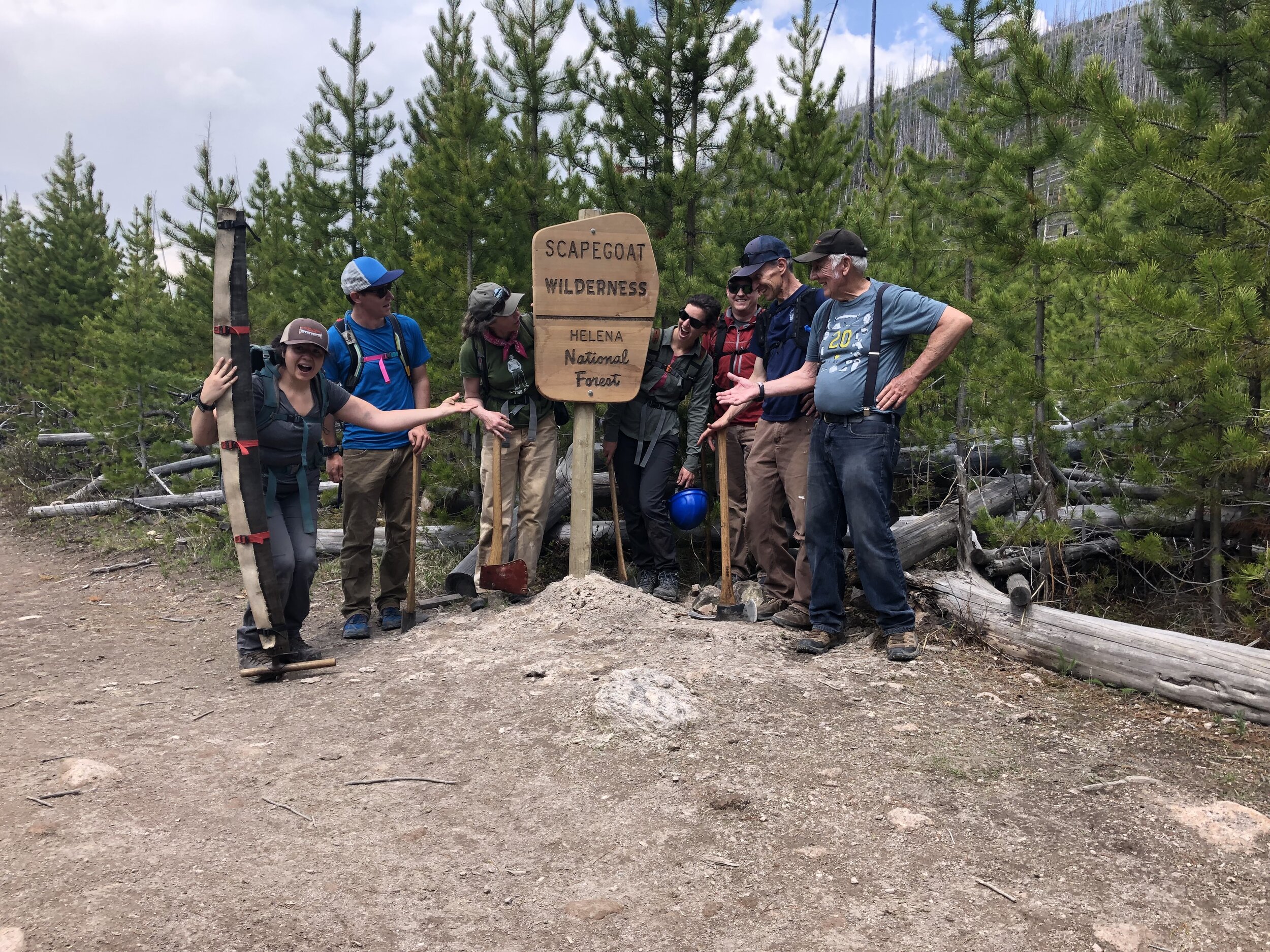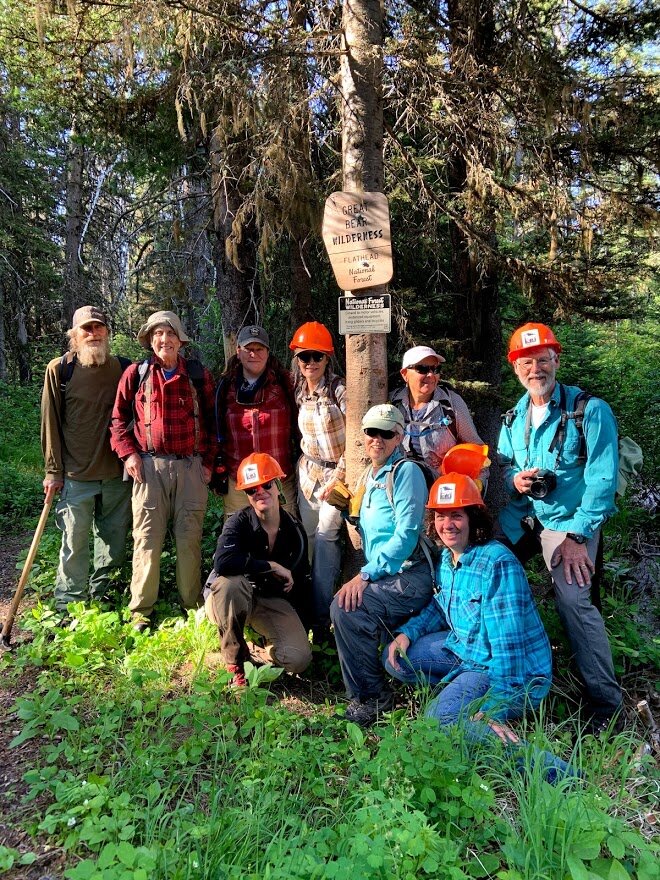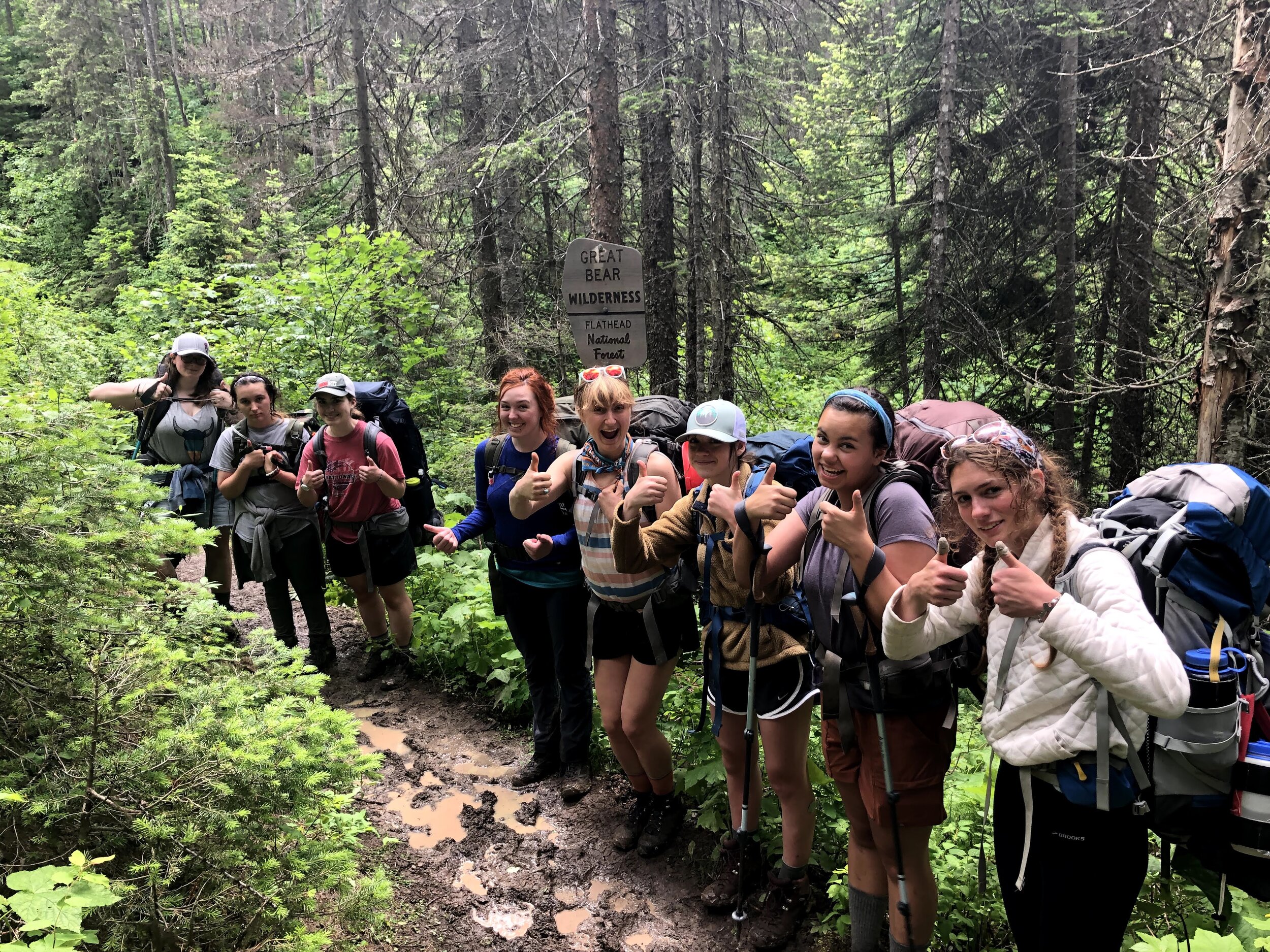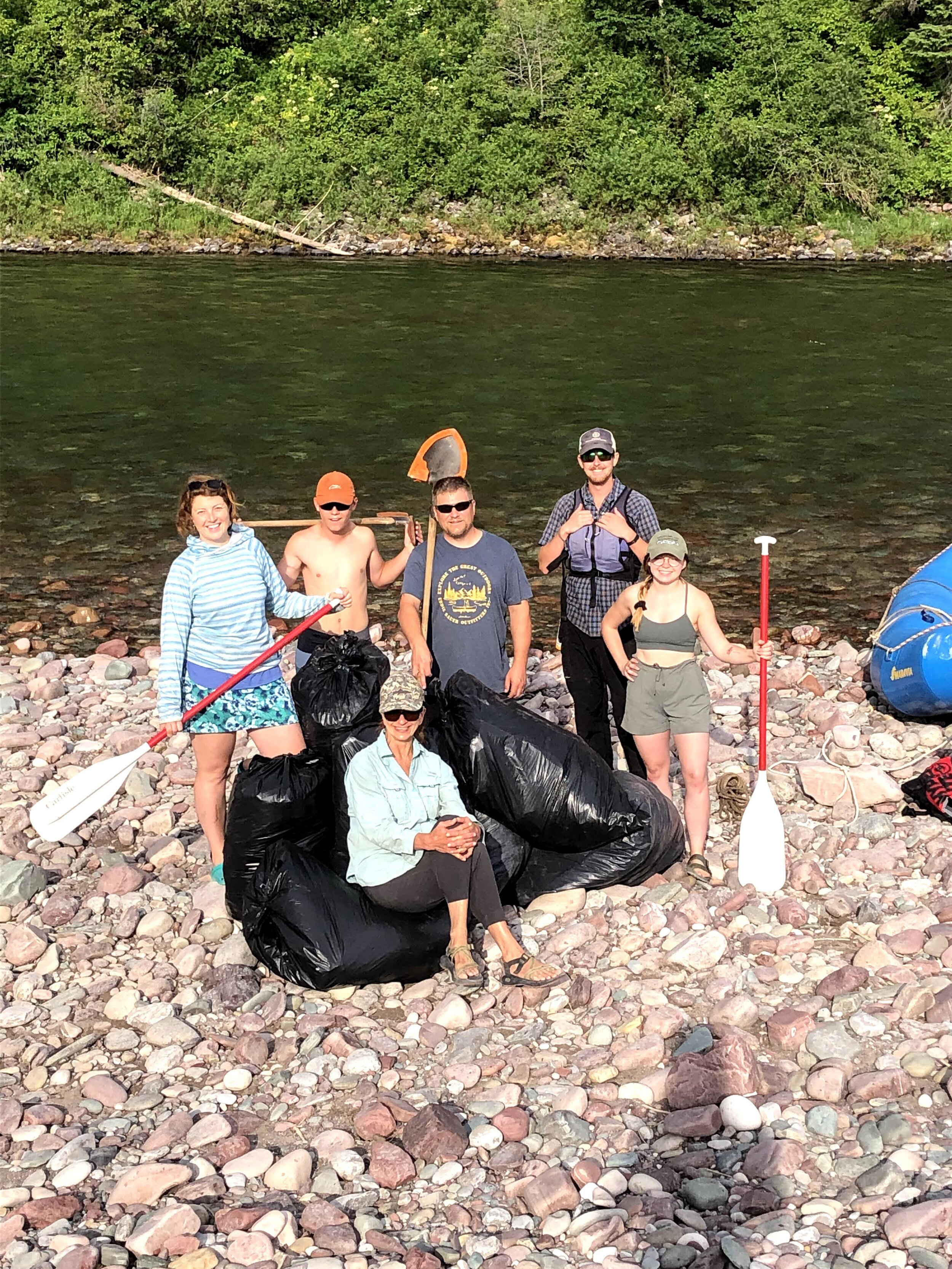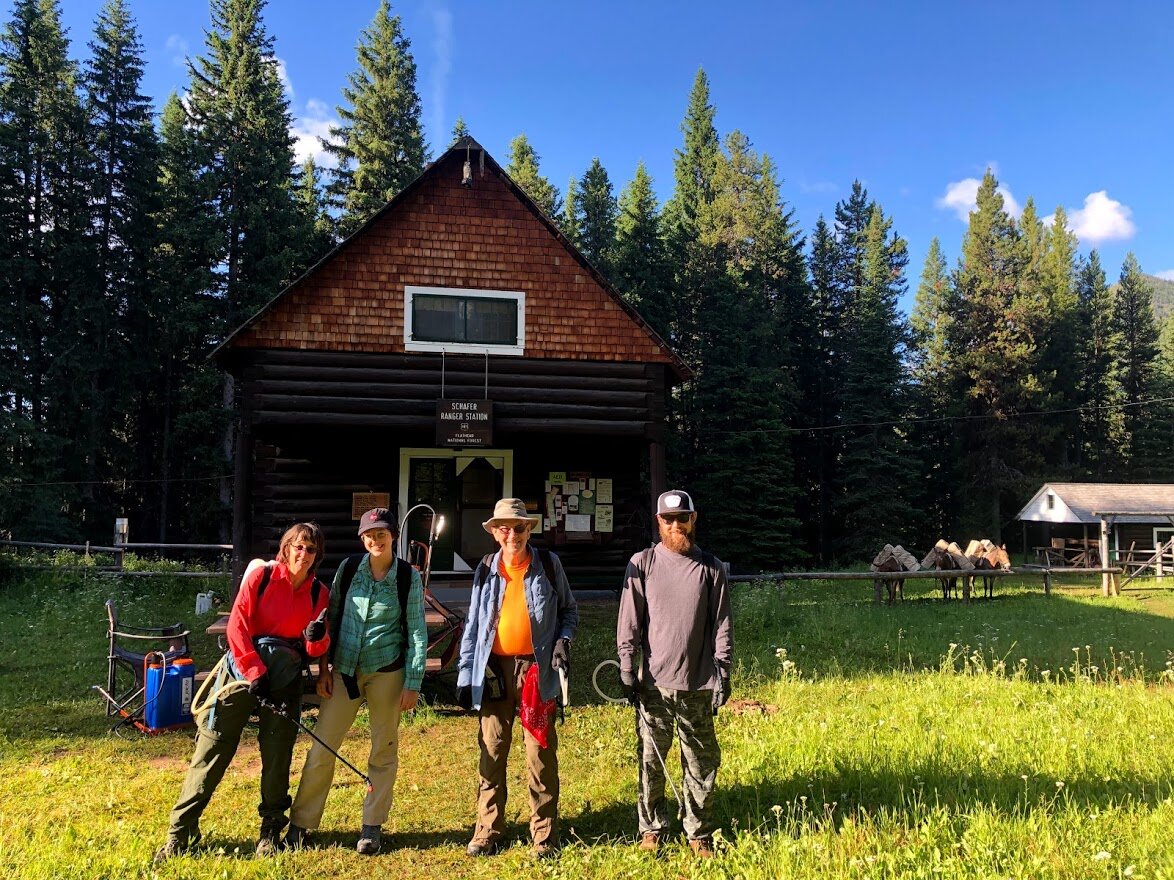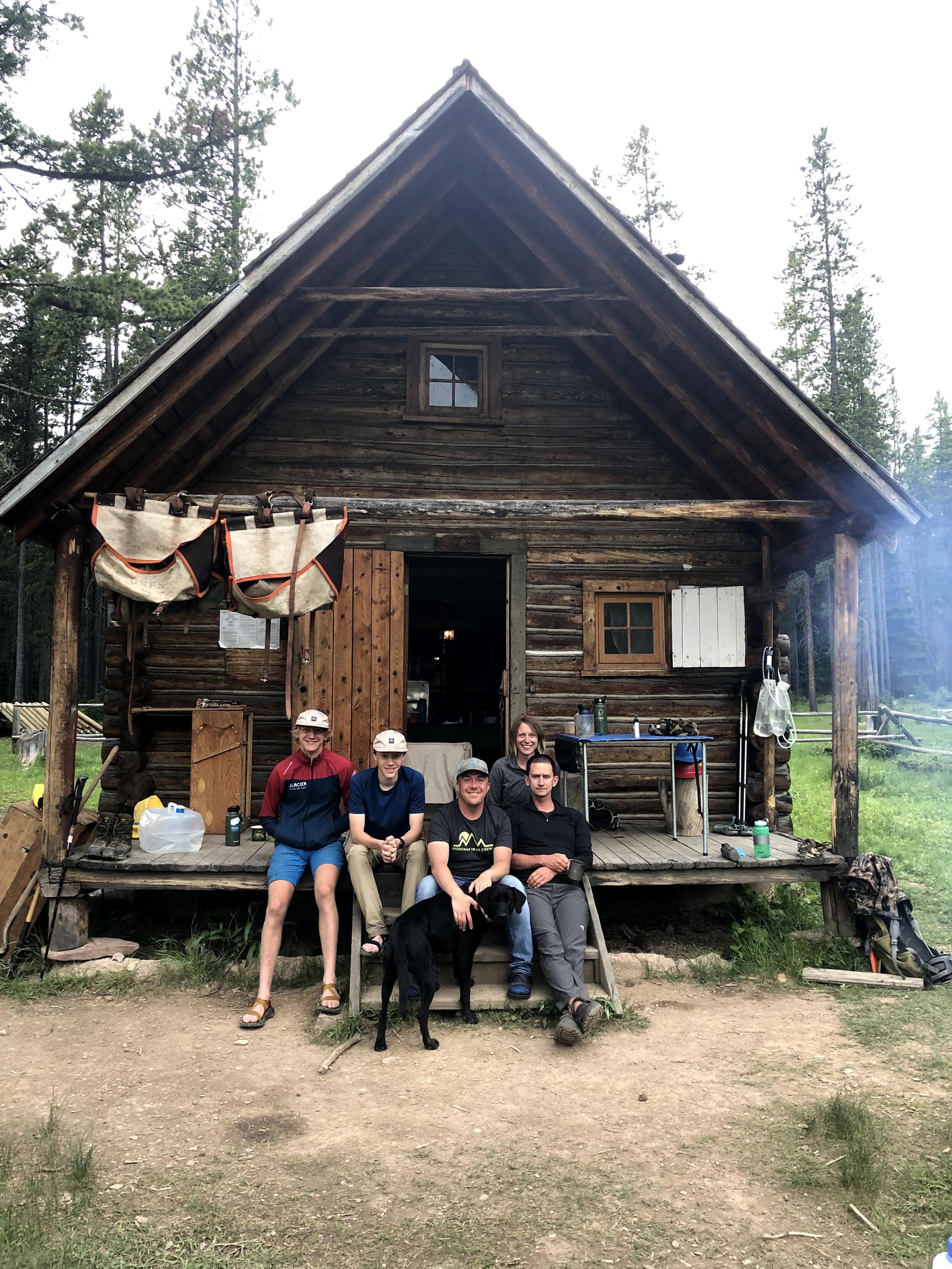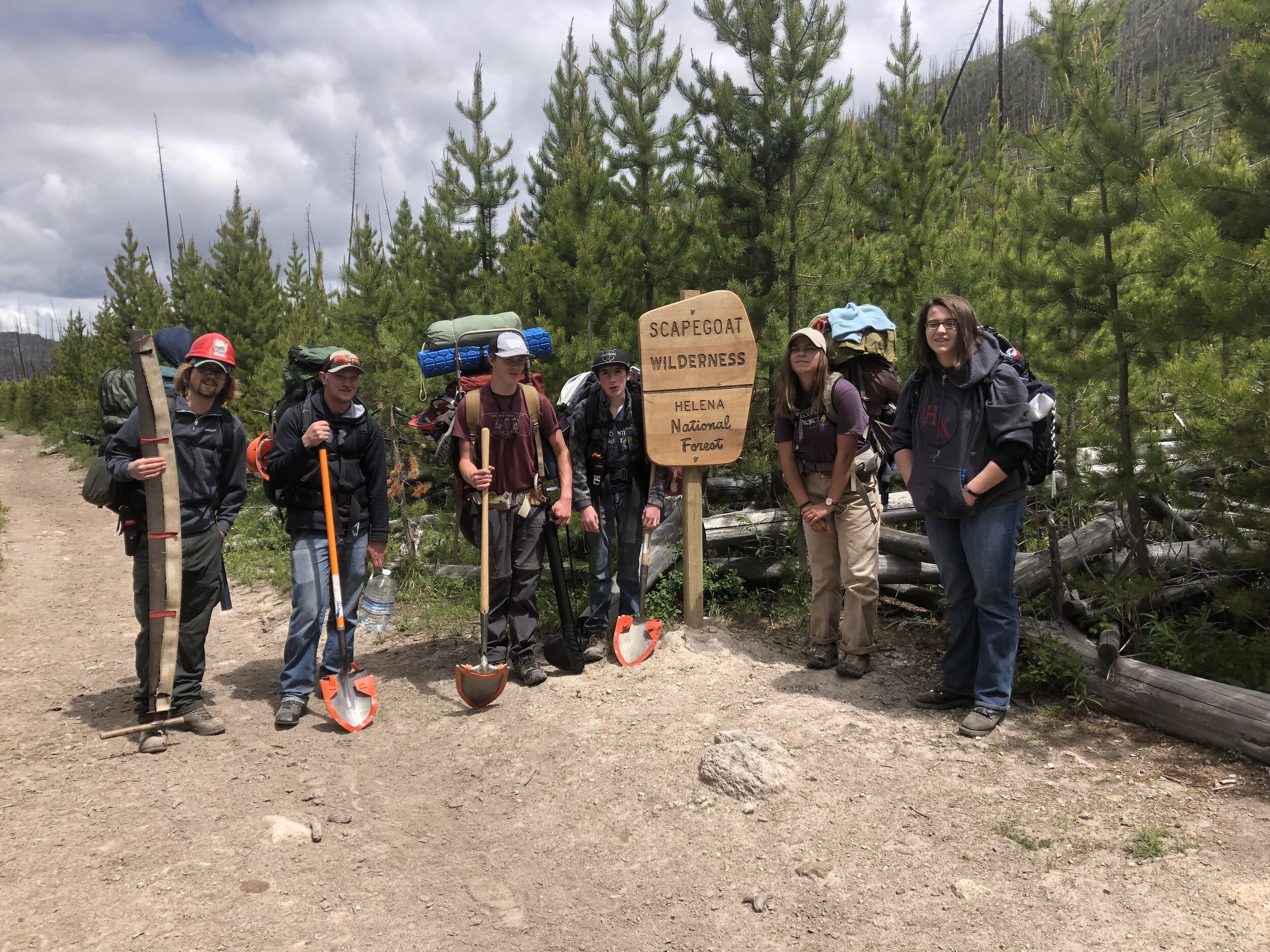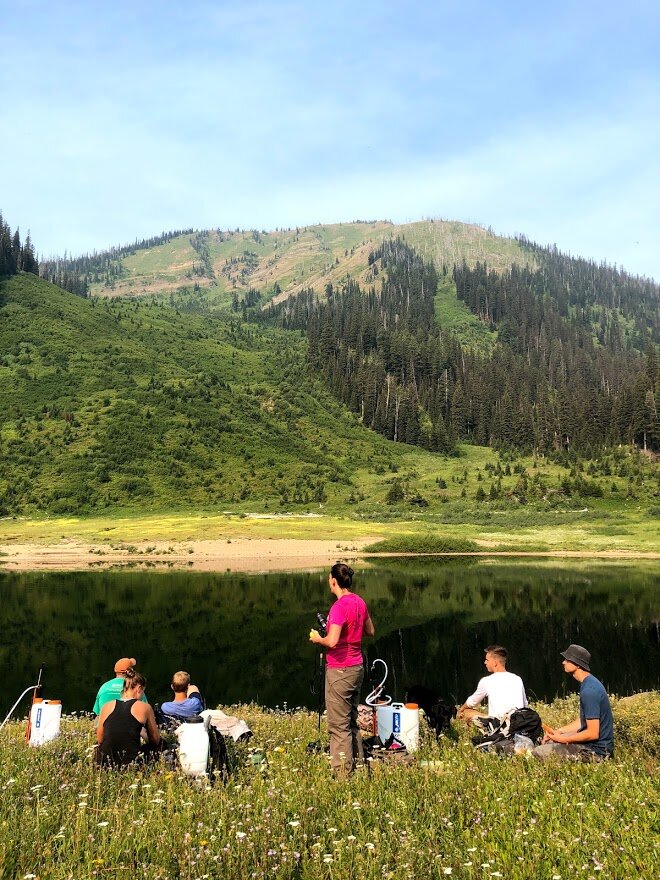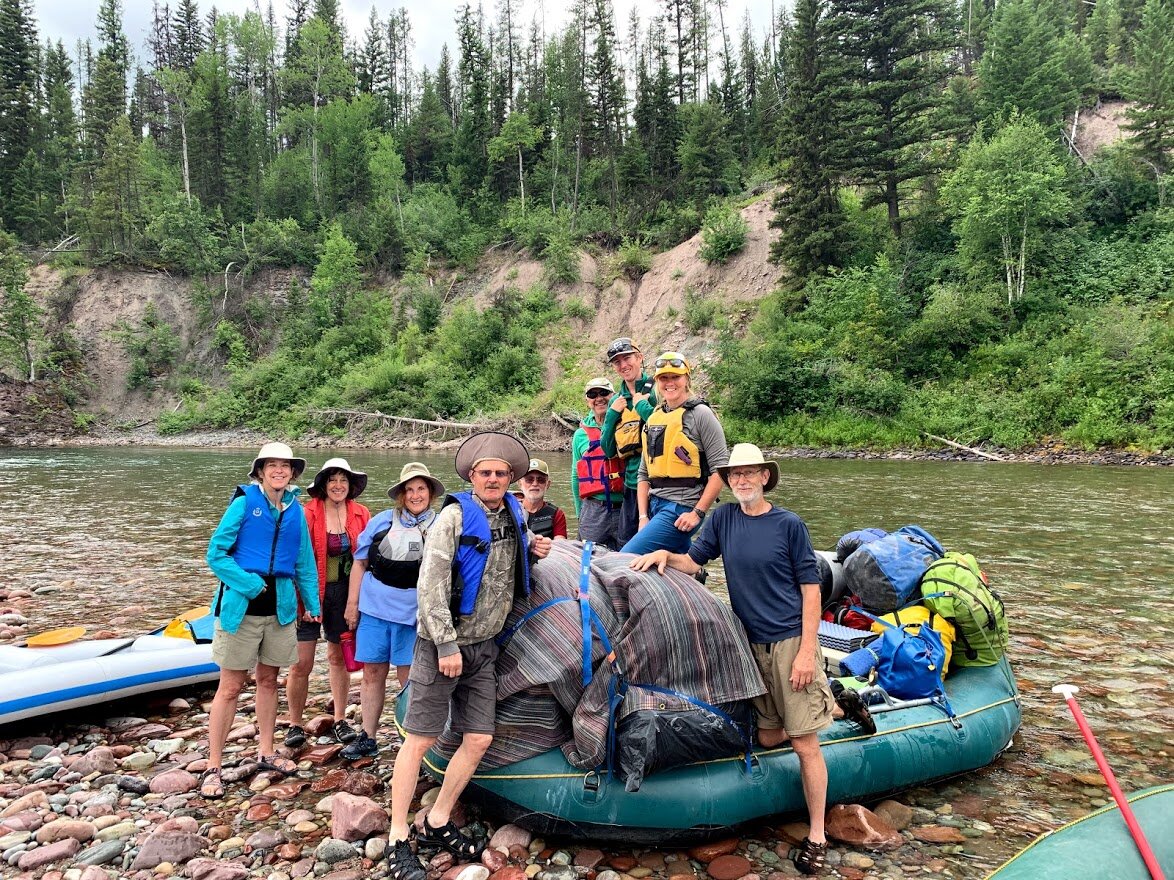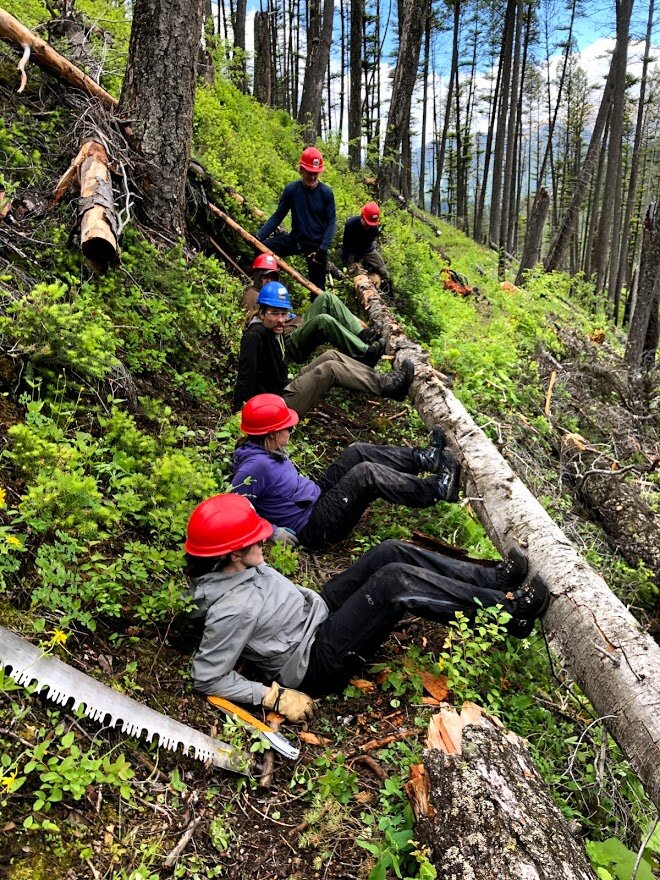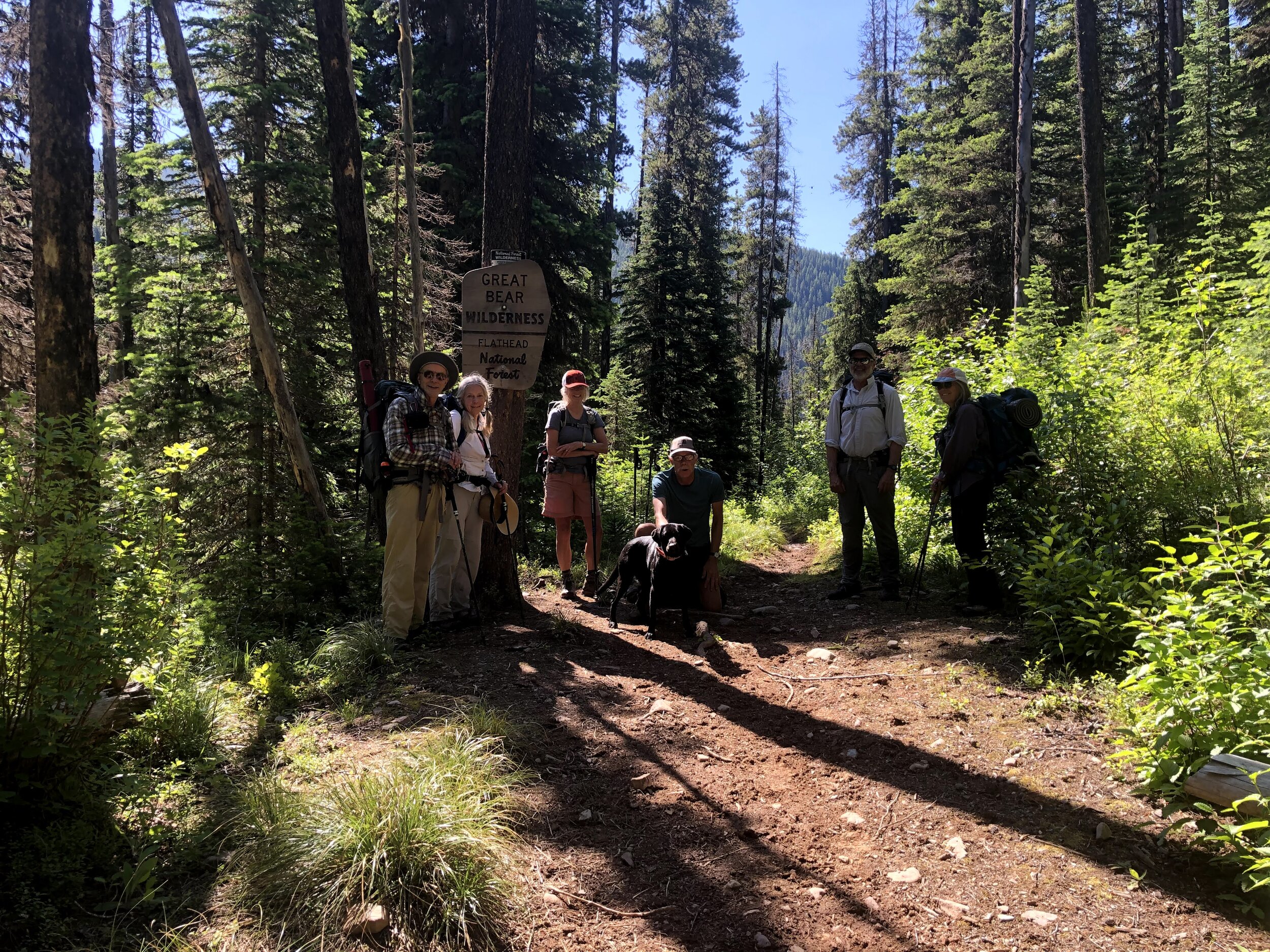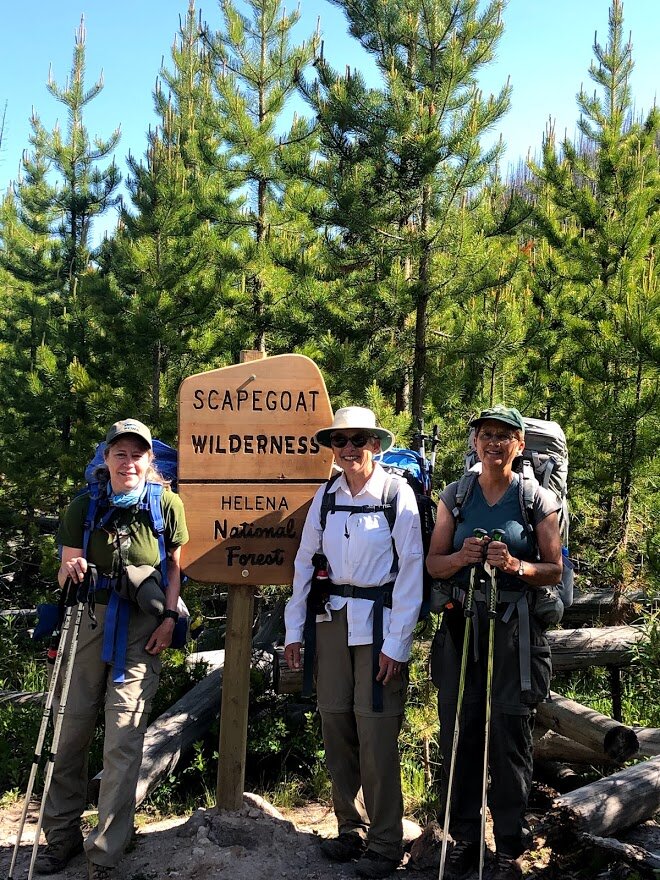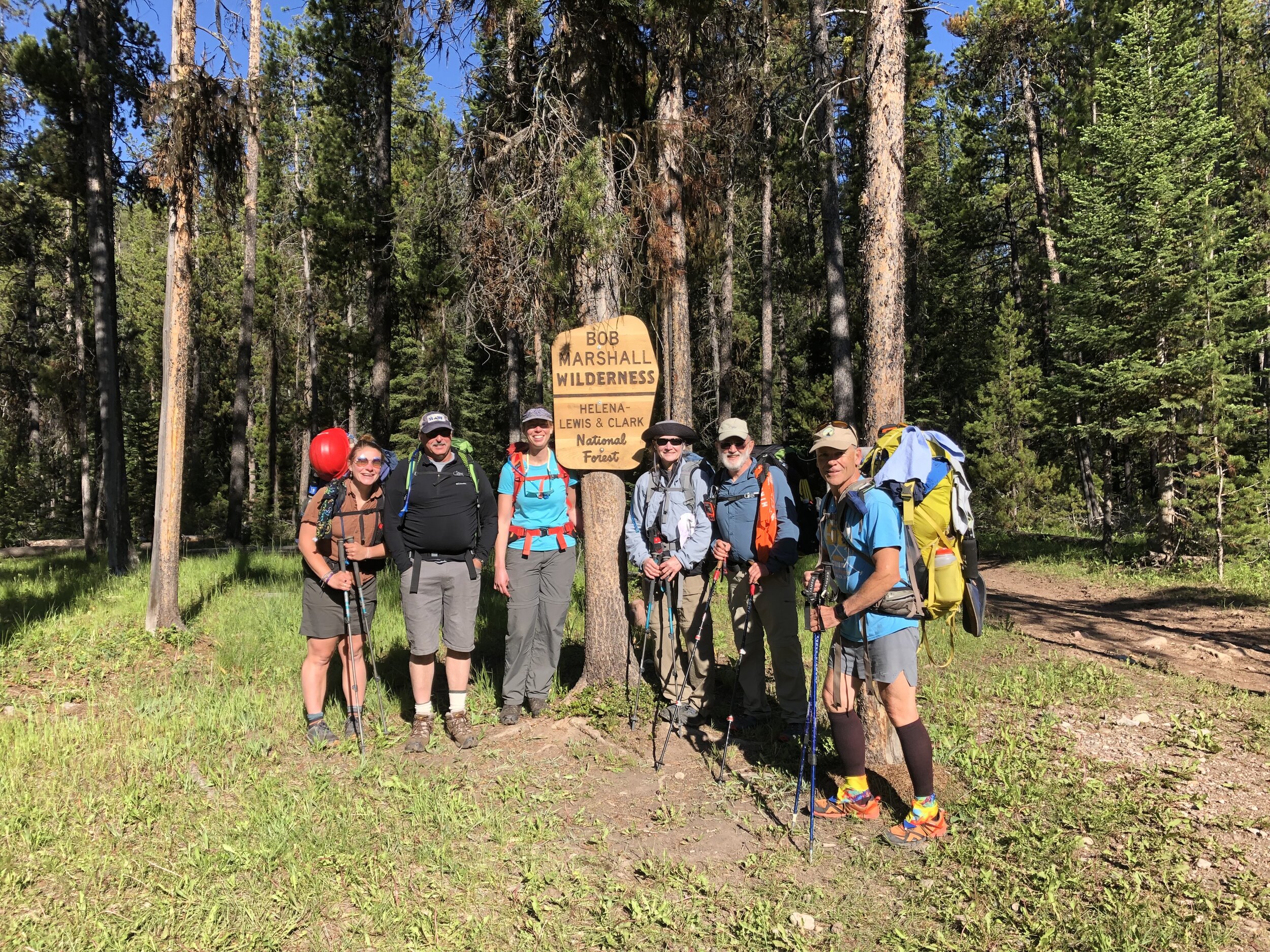Thank you for your interest in volunteering to give back to the Bob! We hope that this experience will be a highlight of your summer. Whether you’re an avid backpacker who wants to hit the trail with a new group, a life-long visitor to The Bob who wants to lend to its stewardship, or a first time camper who’s comforted by having a trip leader organize logistics, BMWF's volunteer vacations are a great way to get outside and give back to Wilderness.
There’s no more intimate way to explore the wilderness of Montana than by helping to build and maintain trails here. You can volunteer for as little as one day or a weekend, or you can spend a week backpacking in the Western Montana wilderness. Families and children ages 12+ with adult supervision are welcome.
The better prepared you are for this adventure, the better experience you will have. Please take the time to read through all of the information below before registering for a volunteer project.
2025 Volunteer Adventures:
2025 Volunteer FAQ Webinars:
Bring all of your burning questions about volunteering to be answered by our staff! They’ll share a run-down of what you can expect, with plenty of time of Q&A.
Wednesday, April 16th from 12-1 PM: Register here
Monday, April 28th from 6-7 PM: Register here
Non-Discrimination Policy
We at the Bob Marshall Wilderness Foundation believe Wilderness is for everyone. We are committed to creating a safe and welcoming environment for people from all backgrounds, races, religions, genders and sexual orientations. Discrimination or harassment by any project participant including volunteers and crew leaders is absolutely not tolerated and will result in immediate removal from a project. The Wilderness does not discriminate, and neither do we. Each volunteer will be asked to acknowledge and agree to the BMWF discrimination policy before joining a project.
Volunteer Info & FAQs
Area Description
Along the Northern Rockies of Montana, the Bob Marshall Wilderness Complex is considered by many to be the “crown jewel” of the wilderness preservation system. The Bob is comprised of over 1.5 million acres of untrammeled wilderness that stretches from Glacier National Park in the north down to Rogers Pass at its southern end. Named after the conservationist and forester, the Bob Marshall Wilderness was established in 1964 with the creation of the Wilderness Act. The Great Bear and Scapegoat Wildernesses were added later in the 1970’s, and the three areas together form the Bob Marshall Wilderness Complex.
Straddling the continental divide, “The Bob” (as it’s known locally) is comprised of towering limestone reefs (including the famous Chinese Wall), range after range of majestic mountains, lush forests, broad basins and valleys, and two “Wild and Scenic” designated rivers. It also contains some of the best wildlife habitat in the lower 48 for elk, deer, moose, mountain goats, bighorn sheep, black bear, and the threatened grizzly bear, as well as native trout.
Long before these lands were deemed “Wilderness”, the Amskapi Piikani (the Blackfeet Nation of Montana), the Niitsítapi (the Blackfoot Confederacy), the Séliš (Salish), Ql̓ispé (Pend d’Oreille or Kalispel), and Ktunaxa (Kootenai) tribes were actively stewarding this landscape. Learn more about native lands in the Bob.
Volunteering Basics
What kind of work can I expect on a BMWF trip?
When you sign up to volunteer with BMWF, you are actually signing up as a US Forest Service volunteer. You will sign the USFS Job Hazard Analysis and be covered under the Forest Service workers’ compensation program if you are injured. As a Forest Service volunteer, you're also expected to put in eight-hour workdays while on trips.
Trail maintenance projects use primitive tools such as crosscut saws, axes, pulaskis, hand saws, shovels, and loppers, which you will be trained and supervised on by a BMWF Crew Leader. Weeds projects involve hand pulling, dead heading, and spraying weeds with supervision. There are a variety of tasks on each trip and we encourage volunteers to take turns and try all of them. Volunteers are also expected to help out with camp chores such as cooking and cleanup – many hands make light work!
What kind of supervision will we have on a project?
A BMWF Crew Leader will be with your group for the duration of the trip. Our crew leaders are USFS trained and are highly experienced in trail maintenance, backcountry first aid and safety, bear safety, and Leave No Trace ethics, and are knowledgeable about the area you'll be working in.
What kind of safety protocols does the Foundation have for trips?
The safety of our volunteers is the highest priority on our trips. BMWF Crew Leaders are all certified Wilderness First Responders and carry a well-stocked first aid kit. All volunteers undergo two major safety trainings during the trip as well as daily safety briefings, which include proper use of Personal Protective Equipment, backcountry safety, and tool use. BMWF trips check in via radio with the Forest Service every day and are in regular communication about any hazards such as weather or fire. In addition, crew leaders carry satellite emergency transceivers to check in or summon help in the case of a radio malfunction.
Does BMWF provide the food for the project?
Yes! Unless otherwise stated with a partner group trip, the Foundation supplies all the food for the trip. We pride ourselves on providing great food for volunteers. We like to make curries with fresh veggies, hearty pasta dishes, and filling burritos. When filling out the registration form be sure to let us know about any dietary restrictions, allergies, or preferences to help us with our menu planning. Meals are very important as you will be working hard and burning lots of calories, so please provide us with plenty of information to help us make a menu that works for you and everyone on your crew.
Does BMWF provide pack support?
BMWF is lucky to have a dedicated team of volunteer packers with horses and mules to haul in supplies for our projects. Unless otherwise noted, all backcountry projects will have pack support for group gear like food, kitchen equipment, and tools. Volunteers will be required to carry all personal gear. If there is additional room on the animals, packers may offer to carry some items like tents or sleeping bags for you. Be sure to say thank you to the packers and their critters! They are volunteers too!
What do we do about all the bears?
The Bob has a healthy grizzly and black bear population. All BMWF trips practice bear aware safety including proper food storage and travel in bear country. Participants are encouraged to bring their own can of bear spray if possible. Volunteers (with the exception of packers) may not carry firearms on any BMWF trip per the Forest Service volunteer agreement, regardless of whether they are licensed to carry a concealed weapon.
Experience and Trip Difficulty
What fitness level should I have to safely participate in BMWF trips?
We use an easy-to-strenuous rating scale for both the hike in to the base camp and the work difficulty. While we don't expect every volunteer to train like an Olympic athlete, we do expect that you sign up a trip that realistically fits your abilities. Remember, you'll be working with a team in a remote wilderness setting where simple overuse injuries and blisters can become a big deal.
If you're unsure, a good fitness test to to see if you're in good shape for a Strenuous rated trip is the USFS 'moderate pack test': hike/walk 3 miles with a 25 pound pack in under 50 minutes without jogging. For a Moderate to Challenging trip, you should be able to walk/hike 2 miles an hour while carrying a 25 lb. pack.
For our friends travelling from further away, remember that the higher elevation may affect your ability level!
Do I need backpacking or backcountry experience to participate in a BMWF trip?
No, you only need to be in good shape, bring the motivation to work, and choose a trip well suited for your abilities. For the most difficult hiking trips you should have some some experience carrying a backpack and hiking long distances over rugged terrain.
If you're brand new to backpacking or the backcountry, BMWF trips are a great way to gain experience! Our crew leaders are all experienced and comfortable teaching you how to set up a backcountry camp, Leave No Trace practices, etc. to help you gain confidence for recreating in wilderness.
Do I need trail maintenance experience to participate?
Definitely not! Our crew leaders will teach you everything you need to know and show you how to use the tools and do the work. Just come ready to work, willing to learn, and motivated to make the work a success! Check out the work difficulty rating for each trip and find one suited for your physical abilities.
What do I have to carry for the hike into camp and to the work site?
BMWF volunteer packers provide pack support for most trips. Their horse and mule string will carry in group gear like food, camp kitchen, tools. Depending on the number of stock they have, there's a good chance they'll also be able to carry some personal gear such as tents, but volunteers should be prepared to carry all of their personal gear (see packing list below). When hiking from camp to the worksite be prepared to carry your lunch, water, rain and/or cold weather gear, personal protective equipment, and tools such as saws, axes, and shovels.
Will I have time off to explore the backcountry?
Volunteers have free time at the end of each work day to hike, fish, relax or enjoy the backcountry however they'd like. Many longer projects also include a rest day where volunteers can enjoy the backcountry on their day off! Check trip project descriptions to see if your trip has a rest day.
What are the age limits to participate on a project?
People ages 12-99 are welcome on our projects. While we love to foster the love of Wilderness in all ages, there are some restrictions with youth. See the Youth participation policy below:
Youth under the age of 12 years will not be enrolled on Forest Service Volunteer Agreements nor will they be allowed to participate on or accompany Foundation projects. Youth 12-15 years of age may be allowed to be enrolled as Forest Service Volunteers on Foundation projects provided:
They are accompanied by a parent or group chaperon
That they are willing and able to participate in the work phase of the project up to their individual abilities
That their presence will enhance, not reduce project accomplishments
That the project work is of a nature that it is reasonable for them to participate in
The Program Director has the discretion include or exclude individual youth.
Youth 16 & 17 years of age may be enrolled as Forest Service Volunteer with or without parental participation on the project provided:
They have parental permission to participate
That the project work is of a nature that is reasonable for them to participate in
The Program Director has the discretion include or exclude individual youth.
Trailhead based or car camping with no hike into camp
Easy hike to camp: Less than five mile hike with little elevation gain
Moderate hike to camp: 5-10 miles with <1,000 ft. elevation gain
Challenging hike to camp: Over five miles with significant (1,000+ ft.) elevation change
Strenuous hike to camp: 10+ miles over mountain passes or on uneven terrain, and/or multi-day hike ins,
Easy work: Bending over pulling weeds or lopping brush
Moderately easy work: Infrequent sawing/digging with hiking breaks
Moderate work: Repeated heavy lifting, sawing, digging etc.
Challenging work: More consistent and repetitive such as sawing or swinging a Pulaski for the full day
Very strenuous work: Difficult hike to the worksite; hard continuous labor (sawing, digging) in difficult terrain
Alcohol, Drugs, and Firearm Policy
Help us keep our projects fun and safe by reviewing these policies before your trip.
Alcohol: If you are an adult participating in a volunteer trip, you are welcome to bring a small amount of alcohol on the project ONLY if it is consumed responsibly, after work hours, and in a manner leaving you able to work the following day. Absolutely no glass bottles are allowed, and be prepared to carry in your own personal supply (some packers will not pack alcohol).
Firearms: Firearms and other weapons are absolutely prohibited on volunteer trips. Crew Leaders carry bear spray and have some available for others. There is no need to carry a weapon in the Wilderness. If you feel like you need one, a BMWF volunteer trip is not for you. Animal packers are the exception to this rule and only carry one to respond to an injured equine.
Marijuana and other Drugs: While marijuana is now legal in Montana, it is still ILLEGAL on federal lands including Forest Service lands where the Bob Marshall Wilderness Complex is located. Other illegal drugs are also prohibited on BMWF trips. Anyone participating on a trip is a Forest Service volunteer under a working agreement. Drug use violates that agreement and could leave you liable for any injury, loss or other issue that occurs.
Trip Costs
BMWF projects are free to everyone. We charge a small REFUNDABLE $75.00 deposit when you register to ensure your commitment to the project. A lot of planning and effort goes into each volunteer trip, so we want to be sure you are dedicated to coming! Deposits can be refunded after you complete the project, or you may choose to donate it to support future work in the Bob.
We do have discount codes available for students and indigenous people. Students may enter the coupon code STUDENT to receive a discounted deposit fee of $25. If you are registered member of an indigenous tribe, please enter the coupon code NATIVELAND to waive the registration fee.
If you are unable to put down for a deposit but still really want to join, no problem! We are happy to waive the fee in special cases. Just shoot us an email and let us know that you pinky promise to show up.
Please note: Per our cancellation policy, cancellations made less than 45 days before the trip and no-shows will forfeit their project registration deposit as a cancellation fee.
Cancellation Policy
It is very important to know that you are expected to commit to the project once you sign up. All of our projects take a lot of time and effort to organize and we want to make sure that we have full trips so that we can complete the project as outlined by our Forest Service partners. Please do not sign up for a trip unless you are committed to doing it.
We do, of course, understand that things happen and circumstances change, so if you must cancel, please do so as soon as possible. Cancellations made less than 45 days before the trip and no-shows will forfeit their project registration deposit as a cancellation fee.
While uncommon, BMWF may find it necessary to cancel a project due to low volunteer sign-ups or safety reasons (i.e. wildfires), but will contact volunteers as soon as possible and typically no later than two weeks before the project start date. For this reason we strongly recommend volunteers purchase trip insurance when making airline reservations or other travel arrangements.
Gear and Packing List
Volunteers need to bring their own personal gear such as a tent, backpack, sleeping bag, work clothes, etc. (See packing list here!) Kitchen and cooking gear will be provided for the group. If you are unable to find any of the personal gear items required, let us know! We have a gear library available with quality items you can borrow.
The Bob Marshall Wilderness Foundation relies heavily on volunteer pack support. All backcountry projects will have stock to haul in group gear (unless otherwise noted). Each packer has up to four head of stock to haul in group gear such as food, tools, and kitchen equipment. Volunteers will be required to carry all personal gear. If there is additional room on the animals, packers may offer to carry some items like tents or sleeping bags for you. Be sure to say thank you to the packers and their critters! They are volunteers too!
Pro Tip: DO NOT wear brand new hiking boots for the hike in! Make sure you take them out on a handful of hikes beforehand!
Dogs
Unfortunately given the possibility of problems arising between your pet and pack-stock, wildlife, or other volunteers we do not allow dogs on BMWF trips. Contact staff for information about service animals on trips.
Backcountry First Aid
Each BMWF Crew Leader is certified as a Wilderness First Responder and carries a well-stocked first aid kit and Forest Service radio to communicate with the right people, in case a situation should arise. Volunteers are expected to bring any personal medication they may need on the trip. If you are prone to blisters, we recommend you pack a personal stash of tape, band-aids, and moleskin. If you enjoy your fair share of ibuprofen, please bring a personal stash.
Emergency Contact Info
Each crew leader carries a Forest Service radio. The Crew Leaders will ‘check in’ with the ranger station each day. In the event that a field volunteer needs to be contacted while they are out on a trip, please call the Bob Marshall Wilderness Foundation office. You can also try BMWF staff at any hour in the event of a true emergency. Phone numbers below.
Rebecca Powell, Program Director
rpowell@bmwf.org - (406) 387-3808 / (406) 471-9445
Ian Bartling, Field Coordinator
ian@bmwf.org - (651) 249-3556
Clifford Kipp, Executive Director
clifford@bmwf.org - (406) 387-3847 / (406) 270-9049
Additional Weeds Project Info
Are noxious weeds really that big of a problem?
The health and integrity of our wild places are under threat from these invasive plants! Read this article for more information.
What do I need to bring on a weed's project?
Long pants, long sleeves, and closed toe shoes or boots will keep your legs from being scratched and poked by pesky weeds and are strongly recommended for our weeds trips. We will provide work gloves but it is also fine to bring a personal pair that you know you will be comfortable in.
Do I have to have experience spraying or pulling weeds to participate?
No you do not. The BMWF weeds crew leader is highly trained and will teach you how to do the required work, including how to identify the target weeds and some native plants.












